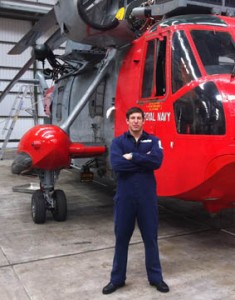
Rare success: the Navy celebrate their 2010 triumph, which followed a late conversion by Dave Pascoe (with trophy)
By Alan Pearey, Rugby World Deputy Editor
Like Canute, the Royal Navy must try to turn back the tide at Twickenham this weekend in the annual Babcock Trophy match. Only twice in the pro era have the Navy beaten the British Army to take the Inter-Services Championship title and on both occasions, in 2001 and 2010, Dave Pascoe was at the heart of the triumph.
The scrum-half joined the Navy in 1998, training as an aircraft engineering technician, and has played in the past 12 championships.
When he was first involved, the build-up for the big game was a low-key affair. “You’d meet up on a Wednesday, play, then return to your unit,” says Pascoe, in his seventh season as Navy captain. “The Army-Navy match has evolved onto a much bigger scale. It’s the same game but with a 60,000 crowd and live coverage on Sky, it’s become a massive spectacle.”
After tasting victory in his first Army-Navy game, Pascoe had to get used to regular disappointments, with eight successive defeats in the fixture – some of them by thumping margins. It prompted some soul-searching among the Navy hierarchy. “After we had 50 points put on us, I was asked, ‘What do you need to close the gap on the Army?’ I said we needed players to be together, to train together.”
So began an annual ten-week training camp that allows not only a team to be knitted together for the Inter-Services Championship but younger players to be developed for future years. It has done wonders for their preparation, with instant reward in 2010 when Pascoe’s late conversion brought the Navy a 24-22 success.
Players are deployed all over the world and the camp allows them to come together as a squad. After playing a game, they can analyse it in the bus on the way home and the next morning be out on the paddock working on any weaknesses.
“Some people (in the Services) wonder why we can’t meet up on Friday and play the next day. But the camps are invaluable. I hope they are here to stay but we have a very young squad and if the camp didn’t happen next year the education they’ve had as regards training or nutrition or skills hopefully would mean they could develop themselves. The improvement should come in the next couple of years as long as we keep growing, as long as they continue that professional attitude through the year.”
The Navy’s second-most capped Navy player, Pascoe has often flown to a tour of duty the day after the Army-Navy match. He has worked on the Sea King helicopter all his life and is currently deployed with 771 Squadron (search and rescue) in Cornwall; call-outs range from getting injured fishermen off their boat to aiding walkers trapped by the tide, or even getting a farmer’s cows off a cliff. Like everyone else involved in this weekend’s match, he’s indebted to colleagues for covering the workload while he’s on rugby duty.
With far fewer players to choose from, the Navy are perennial underdogs but they will be heartened by the presence of right-wing Josh Drauninui, the Worcester professional who missed out last year because of injury. The Navy have blooded 11 new caps this season and for the first time in 25 years have beaten both Varsity teams, Oxford and Cambridge, in the same campaign.
Yet a sobering statistic is that while they relied on a late Ian Cooper try to beat the RAF 13-6, the Army demolished the same opponents 59-0. Chris Budgen and Isoa Damudamu, long-established pro players, are only on the bench for the Army.
A full day of rugby kicks off at 10.30 at the nearby Kneller Hall with the Army-Navy women’s match, along with the Army Master v Royal Navy Ancient Mariners. At noon at Twickenham, Combined Services U23 face Oxford/Cambridge and the Military Wives Choir will be performing just before the Babcock Trophy kick-off at 3pm.
Tickets will be on sale on the day for £20 (adults) and £10 (juniors). Charity of the day is the Royal British Legion and all proceeds from the match go to charities.
BRITISH ARMY v ROYAL NAVY, TWICKENHAM, SATURDAY 28 APRIL, KICK-OFF 3pm. Live on Sky Sports via the red button
ARMY: Cpl Ceri Cummings; LBdr Sam Speight, LCpl Peceli Nacamavuto, LCpl Gerhard Wessels, Lcpl Semesa Rokoduguni; Pte Jack Prasad, Cpl Tom Chennell; LBdr Ken Dowding, LSgt Matthew Dwyer, LCpl Ricky Reeves, Cpl Dave Bates, Sgt Darrell Ball (capt), LBdr Ifereimi Boladau, Capt Mark Lee, LCpl Joe Kava.
Replacements: WO1 Stuart Silvester, LCpl Chris Budgen, Sgt Paul Llewellyn, LCpl Maku Koroiyadi, LCpl Isoa Damudamu, Capt Dave Duffus, Pte James Read.
ROYAL NAVY: AET Jonathon Humphrey; Logs (CS) Josh Drauniniu, AB Darren Bamford, ET (ME) Dale Sleeman, S/Lt Andy Vance; Capt TM Tom Glover, POAET Dave Pascoe (capt); NA (AH) Kyle Mason, NA (AH) Ben Priddey, Lt RN Tom Blackburn, NA (HA) Joji Quarnivalu, POAET Marsh Cormack, Mne Ben Fox, MA Sam Laird, Sgt Gaz Evans.
Replacements: Lt RN Dale Smith, AET Kye Beasley, Slt Hugo Mitchell-Heggs, ET (WE) Ian Cooper, Mne Setareki Raumakita, Mne Jack Foster, Mne Nathan Huntley






